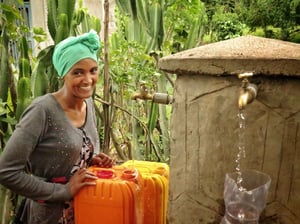
‘‘A big scar on my knee carries my old memories,’’ says Ayal Melaku. She remembers the day it happened. While walking back home carrying a clay pot of dirty water that was 20 liters (44 pounds), Ayal fell and injured herself. ‘‘I sustained an injury on my left knee that bled and swelled slowly. It prevented me from walking to school and I missed class for 15 days in a row,’’ she says.
Ayal lives in Robit village in the Ambassel district, 290 miles north of Ethiopia’s capital. She is the third of seven children and as a young girl, helped her mother with household chores.
She was responsible for fetching water from the nearest river called Ajwa. The teenager left home at day break and walked four hours to and from the river each day.
The water from the river was dirty and polluted. She remembers one afternoon, as she was crouched down to draw water from the stream, she saw a frothy mass of bubbles forming in the running river, which indicated somebody was bathing nearby. ‘‘It was disgusting to see that,’’ Ayal said.
The lack of clean water in Ambassel district left the community in desperation. Girls and mothers bore many of the hardships. Carrying wet laundry and dirty water for hours was part of their daily activities. Ayal and her siblings suffered from waterborne diseases and missed classes when they were sick. With low grades and poor attendance, schoolgirls were often forced to drop out of school and became vulnerable to early marriage.
Ayal attempted to avoid this fate and attended double shifts at school, walking two additional hours every day until grade nine. The long hours of walking sapped her energy and affected her scores. She eventually dropped out. She worried that if she was not in school, she would be forced into an unwelcome marriage. Ayal decided to leave the area to look for work and avoid early marriage.
After working for years as a housemaid, Ayal came back to Robit village. She was stunned when she saw a water point near her home. World Vision had capped a nearby spring and provided water to the surrounding communities. The nearby water tap had alleviated the problem Ayal lived through. ‘‘I never thought clean water would be available at a minutes’ walk. This is a miracle,’’ Ayal says in astonishment. Today, children in the community lead healthy lives, have ample time to focus on their education and pin their hopes on a better future.
Ayal, now 30, does not dare to go back to school to learn with teenagers, but is very happy to see her dream become real for her younger siblings. She encourages them to study hard and make use of the educational opportunity they have. Along with other children in the community, Ayal’s siblings have been trained on sanitation and hygiene at school. They are healthy and excited to practice the clean water lessons they’ve learned and share their understandings with her. ‘‘There is a great change in our children’s way of life,’’ Ayal says with a smile.







